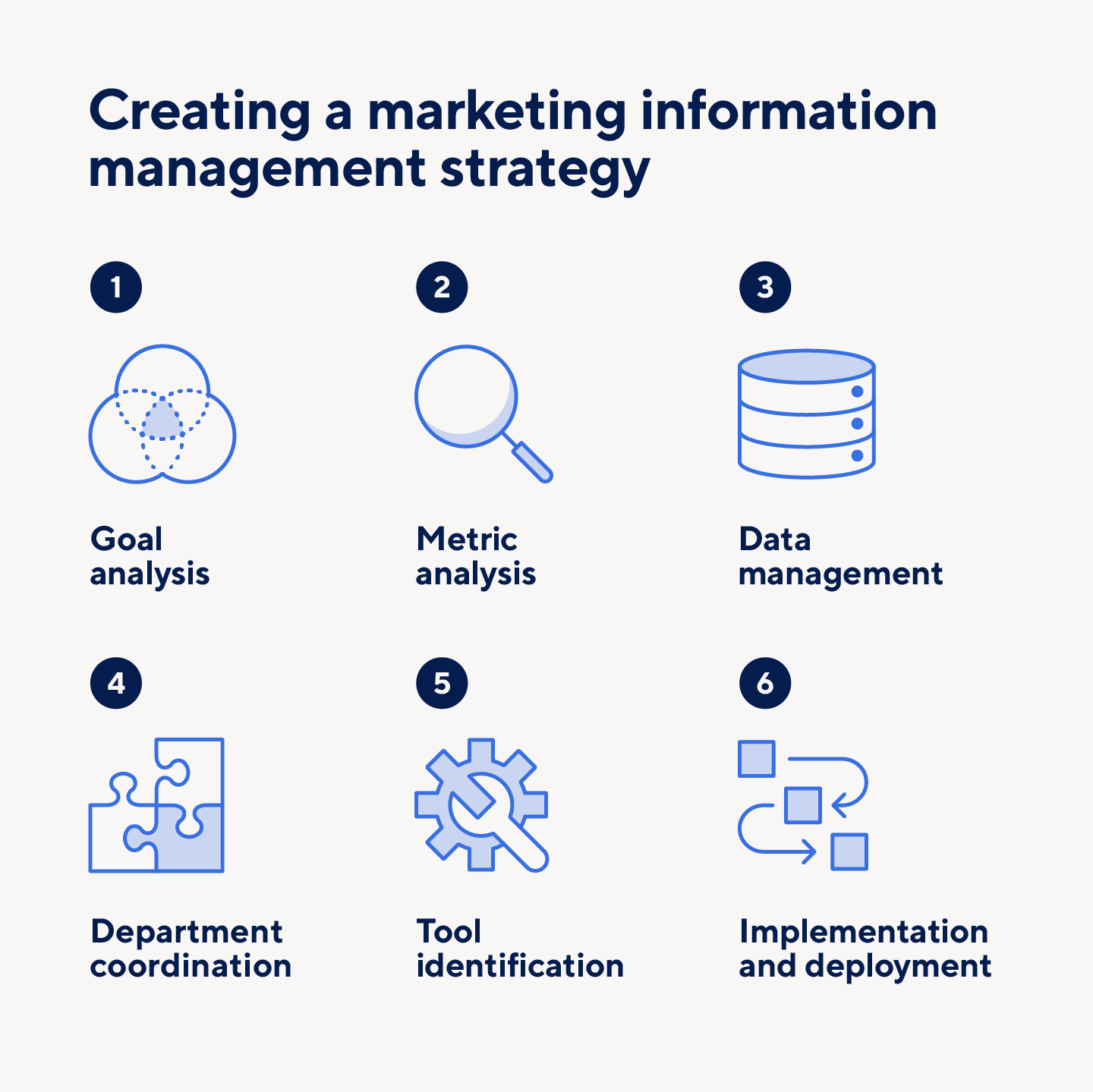Marketing-Information Management is the process of collecting, organizing, and analyzing data to make informed marketing decisions. This includes gathering market research, tracking customer behavior, and identifying trends and opportunities.
In today’s competitive business landscape, being able to make strategic marketing decisions is crucial for success. Marketing-Information Management helps businesses gather and analyze data to gain valuable insights into their target market, customers, and competitors. By effectively managing marketing information, companies can identify consumer preferences, develop effective advertising campaigns, and improve overall marketing strategies.
By harnessing the power of data, businesses can make more informed decisions and drive better results. Whether it’s analyzing customer buying behavior, tracking market trends, or identifying new opportunities, Marketing-Information Management plays a pivotal role in helping businesses gain a competitive edge in the market.
The Importance Of Marketing-information Management
Marketing-Information Management is a crucial aspect of any business strategy, as it plays a pivotal role in understanding customer behavior and assessing the competitive landscape. By effectively managing marketing information, organizations can make informed decisions, develop targeted campaigns, and gain a competitive edge in the market.
Understanding Customer Behavior
Understanding customer behavior is essential for businesses to create tailored marketing strategies. By analyzing customer preferences, purchasing patterns, and feedback, organizations can refine their offerings to meet the specific needs of their target audience.
Competitor Analysis
Conducting thorough competitor analysis allows businesses to gain insights into their rivals’ strategies, strengths, and weaknesses. This information is invaluable in shaping marketing strategies, identifying potential market gaps, and positioning products or services effectively.

Credit: monday.com
Strategies For Effective Marketing-information Management
Marketing-information management plays a crucial role in shaping successful marketing strategies for businesses. By effectively managing marketing information, companies gain valuable insights into their target audience, identify market trends, and make informed decisions. To facilitate this process, businesses employ various strategies for data collection and analysis. Let’s delve into two key aspects of marketing-information management: data collection methods and data analysis techniques.
Data Collection Methods
Data collection is the foundation of marketing-information management. It involves gathering relevant data from various sources to gain insights into customer behavior, preferences, and market trends. Here are four common data collection methods businesses can employ:
- Surveys and Questionnaires: Businesses can design surveys or questionnaires to gather information directly from their target audience. This method allows for collecting specific data points tailored to the company’s marketing objectives.
- Website Analytics: By leveraging tools such as Google Analytics, companies can gather data on website visitors’ demographics, behavior, and engagement. This information helps understand online customer interactions and optimize website performance.
- Social Media Monitoring: Monitoring social media platforms enables businesses to track customer sentiment, engagement, and brand mentions. This data provides insights into customers’ perceptions and preferences.
- Sales and Customer Relationship Management (CRM) Systems: Businesses can tap into their sales and CRM systems to gather data on customer transactions, purchase history, and customer interactions. This information helps identify customer preferences, buying patterns, and loyalty.
Data Analysis Techniques
Once data is collected, businesses need to employ effective analysis techniques to derive actionable insights. Here are three common data analysis techniques for effective marketing-information management:
- Data Segmentation: By segmenting collected data based on various criteria (e.g., demographics, purchase behavior), businesses can target specific customer groups with tailored marketing campaigns. This leads to higher conversion rates and customer satisfaction.
- Trend Analysis: Analyzing long-term data trends helps businesses identify market patterns, predict future consumer behavior, and adapt marketing strategies accordingly. It enables companies to stay ahead of market changes.
- Sentiment Analysis: Leveraging natural language processing techniques, sentiment analysis allows businesses to gauge customer sentiment about their brand, product, or marketing campaigns. This information helps adapt messaging and communication strategies to align with customers’ preferences.
Utilizing Technology For Marketing-information Management
Crm Systems
CRM systems help businesses manage customer interactions, streamline processes, and improve customer relationships.
Big Data Analytics
Big data analytics enables companies to analyze large sets of data to gain insights and make informed marketing decisions.
Challenges In Marketing-information Management
In today’s digital age, companies have access to an unprecedented amount of data. While this abundance of information can be a valuable asset, it also presents challenges in managing and utilizing the data effectively. In marketing-information management, companies must navigate various obstacles to ensure the privacy and security of data, as well as to handle the increasing problem of information overload.
Data Privacy And Security
The issue of data privacy and security has become a major concern in the digital landscape. With the frequent occurrence of data breaches and cyber attacks, companies must exercise caution when collecting, storing, and using customer information. Protecting customer data is not only a legal and ethical responsibility but also essential for maintaining customer trust and safeguarding business reputation.
To mitigate the risks associated with data privacy and security, companies must follow industry best practices and adhere to data protection regulations such as the General Data Protection Regulation (GDPR). Implementing secure data storage systems, encrypting sensitive information, and regularly updating security protocols are some of the measures that can help address this challenge.
Information Overload
The abundance of information available today has led to a new problem – information overload. Businesses are inundated with data from various sources, making it difficult to identify relevant insights and make informed marketing decisions. This overload not only hampers productivity and efficiency but also increases the risk of making inaccurate or misguided decisions.
To combat information overload, companies need to implement effective data management and analysis strategies. This includes investing in advanced analytics tools that can process and interpret data efficiently. By leveraging technologies like machine learning and artificial intelligence, businesses can identify patterns, trends, and actionable insights from voluminous datasets. Additionally, establishing clear goals and criteria for determining the relevance of information can help prioritize and filter data effectively.
Measuring The Success Of Marketing-information Management
Measuring the Success of Marketing-Information Management is crucial for businesses to track the effectiveness of their marketing efforts and make informed decisions. By evaluating key performance indicators (KPIs) and conducting ROI analysis, companies can gain valuable insights into the impact of their marketing information management strategies.
Key Performance Indicators
Key Performance Indicators (KPIs) are metrics that help assess the performance of marketing-information management initiatives. These indicators may include website traffic, conversion rates, customer engagement, and lead generation. By regularly monitoring KPIs, businesses can identify areas for improvement and make data-driven decisions to optimize their marketing strategies.
Roi Analysis
ROI Analysis involves calculating the return on investment for marketing-information management activities. It allows businesses to determine the revenue generated from marketing efforts relative to the costs incurred. By analyzing ROI, companies can gauge the effectiveness of their marketing campaigns and allocate resources more efficiently to achieve better results.

Credit: www.smartsheet.com
Case Studies On Effective Marketing-information Management
Successful Implementation Examples
One of the most compelling examples of successful marketing-information management is the case of XYZ Company. By implementing a comprehensive customer relationship management (CRM) system, XYZ Company was able to track and analyze customer behavior, preferences, and interactions. This allowed the company to tailor their marketing strategies and communication to match the individual needs of their customers, resulting in a significant increase in customer satisfaction and retention.
Another standout example is ABC Corporation, which effectively utilized data analytics to segment their target audience and create personalized marketing campaigns. By leveraging marketing-information management tools, they were able to deliver highly targeted messages that resonated with their customers, ultimately leading to a substantial improvement in conversion rates and sales.
Lessons Learned
These successful case studies underscore the importance of leveraging marketing-information management to understand and connect with your target audience. By utilizing data-driven insights and implementing suitable marketing-information management systems, businesses can create personalized experiences that resonate with their customers, leading to improved engagement, loyalty, and financial performance.

Credit: rockcontent.com
Frequently Asked Questions
What Do You Mean By Marketing Information Management?
Marketing information management involves collecting, analyzing, and utilizing data to inform marketing strategies effectively. It helps businesses make informed decisions for better targeting and reaching their audience.
What Is A Simple Example Of Marketing Information Management?
A simple example of marketing information management is tracking customer preferences through online surveys and analyzing data to improve marketing strategies.
What Are The 3 Types Of Marketing Information?
The three types of marketing information include market research data, customer feedback, and competitive intelligence. Market research helps understand the target audience, customer feedback reveals their preferences, and competitive intelligence provides insights into competitor strategies.
What Is Information Marketing Examples?
Information marketing examples include ebooks, online courses, webinars, and podcasts. These are effective in sharing knowledge and promoting products or services.
What Role Does Marketing-information Management Play In Businesses?
Marketing-Information Management helps businesses make informed decisions using data analysis and market research.
Conclusion
Effective marketing-information management is an essential component for businesses in today’s digital landscape. By harnessing data-driven insights, businesses can make informed decisions, cultivate customer relationships, and gain a competitive edge. From collecting and analyzing consumer data to implementing strategies that drive growth, marketing-information management empowers organizations to stay ahead in the rapidly evolving market.
Unlocking the power of marketing information ensures businesses deliver the right message to the right audience, enhancing overall performance and driving success. So, embrace marketing-information management and unleash the potential of your business.











